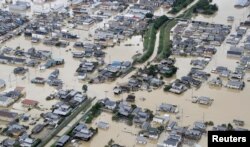Authorities in Japan now say at least 100 people have been killed in mudslides caused by three days of torrential rainfall in southwestern Japan.
More than 65 others remain missing as rescue crews continue a desperate search for survivors — and more victims — through the rubble and debris in affected villages across western and central Japan.
The Meteorological Agency issued rare "emergency warnings" after "historic" rains across the region led to rising rivers and landslides.
Prime Minister Shinzo Abe said 73,000 troops and emergency workers are taking part in the rescue effort. The disaster has forced Abe to canceled plans to travel to Belgium, France, Saudi Arabia and Egypt later this week.
Officials said more than 26.3 centimeters (10 inches) of rain fell within three hours in Kochi prefecture, the highest since such record-keeping began in 1976.
More than 1.3 million people have been orders to evacuate their homes. Another 3.1 million were put on high alert, being warned they may also have to evacuate.
About 48,000 firefighters, police officers and military forces responded to dozens of landslides and other emergency situations, Suga said.
Defense Minister Itsunori Onodera said another 21,000 troops were on standby.
Television footage showed a wooden bridge being swept away by a swollen river in Hiroshima and victims being airlifted into a helicopter from houses in a flooded area.
As residents sought refuge from the landslides, manufacturing giants like Mitsubishi and Mazda were forced to halt operations in some plants, as the flood disrupted supply chains and risked workers' safety.
Saturday evening, a powerful earthquake struck south of the Japanese capital of Tokyo, the U.S. Geological Survey said. The 5.9-magnitude temblor caused some buildings in the city to shake, but there were no immediate reports of damage or injuries.






